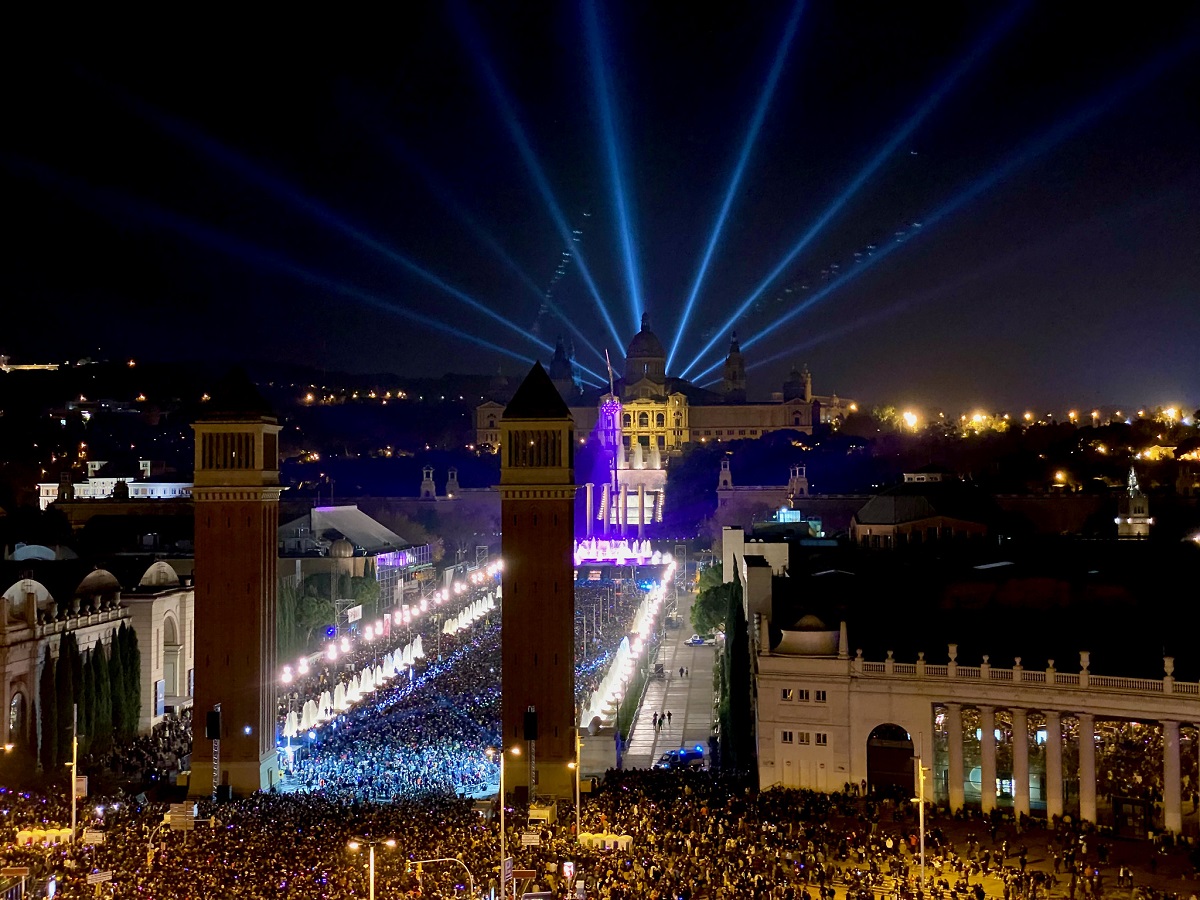Last Updated on October 29, 2025 by Maika Cotton | Published: November 22, 2018
After reaching a boiling point in recent years, mass tourism in Barcelona came to a screeching halt as a result of the COVID-19 pandemic. Now more than ever, it’s important to take a look at sustainable tourism in Barcelona: what it is, how to practice it, and why it matters.

Barcelona welcomed a whopping 20 million tourists in 2019!
On one hand, we’re thrilled and thankful that so many people have loved our city enough to come visit. Barcelona is one of Europe’s most popular destinations, and with so many awe-inspiring sights, it’s easy to see why.
However, when millions of people pour into the city year after year, a few issues are bound to come up. As the local tourism sector begins to recover from the devastating effects of the pandemic, it’s the perfect opportunity to look at how we can do better moving forward.
This guide to sustainable tourism in Barcelona highlights a few common problems that inevitably result from mass tourism. Plus, we’ll show you how you can visit in a responsible and sustainable way without contributing to them.
What's Included
Mass Tourism in Barcelona
While tourism numbers in Barcelona were astronomical in 2019, keep in mind that the city has just 1.6 million residents. That’s just a fraction of the number of visitors who come into town every year!
Of the millions of tourists that visited Barcelona prior to the pandemic, about half only came on a day trip. This means perhaps spending the day in the city as part of a cruise. These visitors usually spend very little money and limit themselves to the city center. This means they are unintentionally causing massive overcrowding in a compact space.
Plus, with such a lopsided tourist-to-resident ratio, it can be difficult for locals to go about their daily lives. The Boqueria Market serves as a prime example of this.
Once a bustling-yet-authentic neighborhood market, the Boqueria has become overrun by eager tourists who come to check this Barcelona icon off their list. Often, they visit without spending any money to support the local vendors.
The mass tourism problem doesn’t just affect tourist attractions themselves. It also has repercussions for the hospitality industry.
In 2017, the local government announced a ban on the construction of all new hotels in the city center. No new licenses for tourist apartments will be granted, either. Both cracked down on practices that commonly drove locals out of their homes in favor of providing accommodations for travelers.
On the other hand, those visitors who do book accommodation spend an average of just two nights in Barcelona. As a result, the same handful of attractions experience massive overcrowding as hordes of tourists rush in, selfie sticks in hand, eager to work their way through the guidebook. With such a short amount of time, there’s hardly a spare moment to get off the beaten path and explore the hidden local gems that make Barcelona what it truly is.
When to Visit Barcelona Responsibly
We’re not trying to scare you away from visiting Barcelona. In fact, we would love for you to come and experience one of Europe’s most magical cities (it’s a big tourist draw for good reason!).
However, it’s more important than ever to be a conscious, responsible traveler when visiting Barcelona. That starts before you even get on the plane, as you start making your initial travel plans.
In order to visit Barcelona responsibly, we recommend coming during the low season. Fall, winter, and even early spring see far fewer tourists than the late spring and summer months, so overcrowding is less of an issue. Even the winter months tend to be warm and sunny, and there are plenty of delicious seasonal foods (which taste even better when purchased from a local vendor!) to enjoy as you explore the city.
Plus, believe it or not, low season still offers plenty of fun cultural events in the city!
- On January 5, you can watch the parade in honor of Three Kings’ Day, celebrated the following day.
- February 8–12 plays host to the Santa Eulaila festival. Plus, Carnaval takes place at the end of the month, sometimes running into early March.
- On April 23, love and literature come together on the feast of Sant Jordi.
- And all throughout the winter and early spring, it’s calçot season! What could be better than enjoying this delicious staple of Catalan cuisine among the locals?
Where to Stay in Barcelona Responsibly
So you’ve decided to visit Barcelona during off-peak season. Great choice! Now you need to find a hotel for your travel dates.
Aim for boutique, non-chain, Catalan-owned hotels. A few of our favorites are Casa Bonay, Hotel Brummell, and Magatzem 128.
With so many tourists visiting every year, demand for accommodation is higher than ever. Additionally, many have taken advantage of the opportunities to rent out rooms and apartments on sites such as Airbnb. Throw in the fact that there were an estimated 50,000 illegal beds for tourists available in unregistered properties prior to the introduction of new regulations, and it’s easy to see the negative impact this can have on the residents who have lived in their neighborhoods for generations.
Want to be sure you’re staying in a legitimate accommodation? The Barcelona tourism website features a handy tool where you can check if the property you’re staying at is registered for tourism.
Where to Eat in Barcelona Responsibly
We here at Devour Barcelona are all about eating sustainably and supporting local businesses over chains. If you’re reading this, that probably means that you’re interested in doing the same, and we applaud you for that!
But what are some best practices for eating like a local, especially in a short amount of time? Focus on Catalan-owned businesses using locally sourced products.
We love Bar del Pla, if you need a suggestion to get you started. Once there, ask your server for recommendations if you’re not sure what to order. They’ll know the highest quality options that locals love.
Avoid international chain restaurants as much as possible. The key is to ensure that every single euro you spend goes back into the local economy.
How to Practice Sustainable Tourism in Barcelona
Once you’re in Barcelona, it’s important to keep these same principles of sustainable tourism in mind as you go about your day. A good way to start is by asking yourself what you want to do, rather than what you think you’re supposed to do.
If you’re not the biggest architecture fan, don’t feel like you have to go checking off all the major Gaudí sights off your list just because the guidebook says you should. And if you are an architecture lover, consider checking out some lesser-known modernist buildings, such as the Recinte Modernista de Sant Pau.
When it comes to exploring the city, think twice about joining a free tour. Be aware that in many cases, the guides have to depend on tips as the only payment for their work. They may even have to pay the company in order to work.
Additionally, the size of the group on a free tour is often too large for the group to move through the city without disrupting daily life of locals. For any tour that you plan to take, research the ethics of the company and the group size before signing up.
As we mentioned before, central neighborhoods can get quite crowded, which makes it difficult for locals who live there to go about their daily routines. Consider getting off the beaten path and visiting neighborhoods outside of Ciutat Vella.
Poble Nou, El Clot, Les Corts and Sants are all great places to start. You’ll be experiencing a slice of local life few tourists get to see, and your tourist dollars (well, euros) will be supporting the hard-working locals who often get the short end of the stick when it comes to mass tourism. It’s a win-win situation!
What Not to Do in Barcelona
We’ve talked a lot about active steps you can take in order to practice sustainable tourism in Barcelona, but there are a few things to keep in mind when it comes to behaviors to avoid as well.
First of all, when it comes to finding your way around, don’t just assume that locals will speak English. Yes, many do, but going up to someone and immediately asking for help or directions in English can come off as rude, even if that’s not your intent. A few words—as hesitant as they may be—in Spanish or Catalan will go a long way.
Once you get to where you’re going, make sure to make the most of your time there. Don’t just visit sights and monuments to take a picture and check it off your list. Sustainable tourism in Barcelona is all about mindful travel.
Research shows that many tourists don’t even go inside the Sagrada Familia, and 20 percent of those that do only spend 10–20 minutes in the interior (just enough time to get a good photo!). This contributes to making the area around the Sagrada Familia, and other popular tourist sites, unnecessarily crowded, in turn making it harder for locals to get from place to place.
If your only reason for going somewhere is to get that iconic Instagram photo (you know, the one that everyone else has), skip it and visit somewhere you really care about instead.
Finally, you’ll probably want to pick up a souvenir or two from your trip. Don’t just pop into the nearest tacky souvenir shop and grab the first fridge magnet you see. Instead, consider supporting a local business or artisan and getting a completely one-of-a-kind souvenir while you’re at it.
Which leads to our next point…
Our Favorite Small Shops and Artisans in Barcelona
Supporting local companies is a great way to ensure that you don’t leave Barcelona with the same kitschy souvenirs as everyone else. Instead, pick up a Barcelona-themed souvenir at a locally owned shop, such as B de Barcelona, OMG BCN, or Barceloning.
Not necessarily after something Barcelona-branded? Check out the lovely artisan soaps or creams at Les Topettes, or gourmet goodies at Colmado Murria.









My wife and I will be in Barcelona on January 5th for the Three Kings Parade and this guide is super helpful. Do a lot of the restaurants shut down for this weekend/holiday?
Thanks Justin! Lots of places probably will be closed on the 6th because in addition to being a holiday, it’s a Sunday. You can try some of these places though: http://devourbarcelonafoodtours.com/useful-information-where-to-eat-in-barcelona-on-sundays/ (we’d recommend calling/emailing beforehand to ask if they’ll be open!). The 5th should be business as usual, plus you can enjoy the parade! https://devourbarcelonafoodtours.com/what-to-do-in-barcelona-in-january/
Very informative! Coming to Barcelona next September will probably book a devour tour
Thanks Bernard! We look forward to seeing you here then!
Well written and spot on. We stayed two weeks in a registered B+B, enjoyed the local bars and eateries, took our host to the Camp Nou and saw Messi score 4, took trains to the neighbourhood market to buy supplies, did cooking classes and wandered the old town on a Devour tapas tour. 9 months of listening to tapes trying to learn Spanish had the locals smiling when I tried ordering anything other than beer! Time must be served to truly enjoy a destination.
Sounds like the PERFECT trip, Stephen. Kudos for taking the time to understand and give back to Barcelona. We hope to see you back here soon!
Barcelona is like a good restaurant, you must go back for more. I have been there three times and every time has been different and better. I was recently there for spring break and I have a different view now of catalonians. Amazing and friendly people. And yes, please be respectful to locals and try to speak their language. You dont have to be fluent, but some phrases will make locals happy.
Absolutely Maria, love this! It’s so true that each time you go back, you get to see a different side of the city.
My wife, 18-year old granddaughter, and I plan to visit July 16 from U.S. What is the best dress code for us to respect the cities of Barcelona and Madrid?
Hi Scott! Summers can feel pretty toasty here, especially with the humidity. Wear whatever you’re comfortable in! You may have heard that no one wears shorts here, but it’s just not true 🙂 Shorts, dresses, skirts and tank tops are all fine! Here are our packing tips for Barcelona (same rules apply for Madrid!) : https://devourbarcelonafoodtours.com/what-to-pack-for-barcelona/
I am so glad I used Google to search for “how to be a good tourist in Barcelona” and found this site. I was very close to booking a short guided vacation in May 2020, but think that my planning skills can tackle a few days in Barcelona and a few days on Mallorca. Is there any particular time in May that is best? Would early May be less crowded? Are there any Barcelona specific holidays to consider in May? Will you be adding on any evening tours in May 2020, or are they just all booked already?
So happy you found us, Jessica! Agreed that you can tackle the planning, and we’ve got lots of posts on the blog to help! The beginning of May might be a little busier than the end—May’s a big month for tourism in Spain in general.
Here are our tips for Barcelona in May: http://devourbarcelonafoodtours.com/what-to-do-in-barcelona-in-may/
How we’d spend three days in Barcelona: https://devourbarcelonafoodtours.com/3-days-in-barcelona/
We just opened up evening tours in May 2020 for you! You can reserve here: https://devourbarcelonafoodtours.com/book-now/
Can’t wait to see you here!
This is a case of too much of a good thing – Barcelona was desperate for an image change and tourists when the olympics came. Now add in a generation of millennials using apps for everything (FB, IG, AirBNB) and you get hordes who all think alike and want the same relatively vapid experience. I live in NYC – even though a much larger city, still the same problems – obnoxious tourists taking selfies, long term residents priced out, local business destroyed by chains and all the rest . This isn’t so much a unique story about Barcelona as it is about a millennial and post millennial generation obsessed with phones/apps and the unintended consequences. The irony here is most people travel at some point, so the people complaining in Barcelona are probably doing the exact same thing to another city and they don’t even get it .
Thanks for your comment! Airbnb and social media certainly have a part to play, but it’s bigger than that. If you take a look at the causes in this Wikipedia article, you can see that there are many things beyond millennials with an impact: low-cost airlines, cruise ships, even the rise of Amazon among the inhabitants of a city, meaning that they support their local businesses less.
As an avid reader of your guides, my last trip was to Seville. I do feel you should be mentioning the problem of security and the lack of it causing fear of using the Metro because of the gangs of pickpockets and áreas that are not safe walk, not to mention the recent murders that took place. Barcelona is not on my list to visit at this time until they get their problems sorted.
Thanks for reading, Graham. It’s true that Barcelona has seen an unusual spike in crime recently. We try and encourage our guests to always stay alert and aware of their surroundings, especially in places like the metro—which goes hand in hand with traveling responsibly!